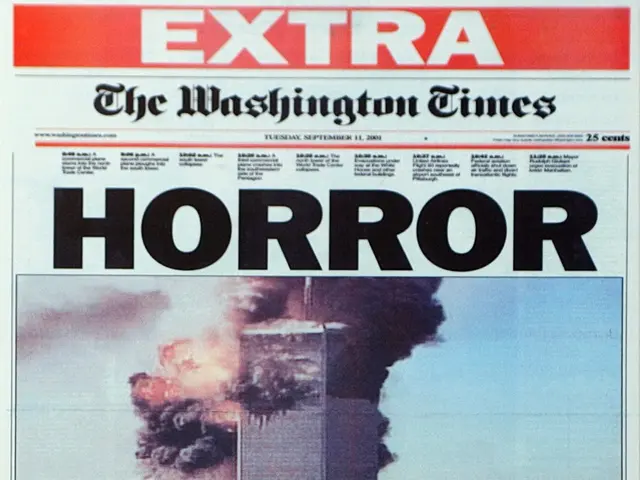United Kingdom firmly supports Israel in its self-defense against terrorism: Statement from Tom Tugendhat, Minister for Security, at the United Nations Security Council
The Israel-Palestine conflict has reached a critical point, with ongoing military operations in Gaza causing a deepening humanitarian crisis. The past week has underscored the urgency of achieving peace goals, as both Israel and Palestine continue to suffer.
The current situation began with Hamas's deadly attack on Israel on October 7, 2023, triggering intense Israeli military operations, including aerial campaigns, ground invasions, and a strict blockade severely restricting humanitarian aid. This blockade has led to famine-like conditions in Gaza, causing widespread distress.
Israel's intensifying offensive seeks full control of Gaza City, home to around one million Palestinians. The escalation involves continuous airstrikes, artillery shelling, and ground operations, causing significant destruction of residential areas and civilian casualties. Since early August 2025, over 50 attacks on residential buildings in Gaza City have been recorded, resulting in numerous fatalities, including children and entire families. Displacement is massive, and humanitarian conditions are desperate, with aid organizations warning of a potential full-scale famine without a ceasefire and sustained access to aid.
Hamas, the central actor in the conflict, has been using innocent Palestinian civilians, including children, as human shields and has embedded itself in civilian communities. This has led to tragic incidents where Hamas's rockets often fall short, causing injury and death to innocent Palestinians, making them victims of Hamas as well.
The international community is calling for a ceasefire, protection of civilians, and a political resolution to end the conflict. The United Nations and top officials warn that there is no military solution and advocate for renewed diplomatic efforts toward a two-State solution. The UN Security Council and humanitarian bodies cite violations of international law due to Israel’s blockade and military strategy, demanding immediate measures to halt civilian suffering and ensure aid access.
The UK stands resolutely with Israel in defending itself against terror, but urges Israel to act in accordance with international humanitarian law to avoid harming civilians. The UK has committed an additional $37 million to help civilians in Gaza, emphasizing the need for sustainable and scaled humanitarian access in Gaza. The Secretary-General has also emphasized this need, and the recent opening of the Rafah crossing to aid trucks is an important first step. However, it is not enough, and the UK is actively working towards diplomatic solutions to prevent the conflict from spreading further.
Some of the hostages being held in Gaza are British citizens, and some of their families were recently present in the same room. The UK calls for urgent humanitarian support to be provided to Gaza, with sustained and unimpeded humanitarian access allowed for lifesaving support to reach civilians quickly and effectively.
The conflict has regional dimensions, involving Hezbollah, Iran-backed groups, and escalating confrontations beyond Gaza. The events of the past week have underscored the urgency of achieving these peace goals. The UK's stance is that hope and humanity must prevail in the conflict, and it continues to engage with regional friends and partners to prevent escalation.
It is crucial to remember that Palestinians are also suffering, with thousands killed and over 1 million displaced in the conflict. Hamas does not prioritize the well-being of its fellow citizens, instead caring more for the opinion of its paymasters in Tehran. Renewed diplomacy and humanitarian access are the keys to ending this conflict and alleviating the suffering of both Israelis and Palestinians.
- The deepening crisis in Gaza, exacerbated by ongoing war-and-conflicts, has led to a call from the international community for political resolution and a ceasefire, particularly in light of the humanitarian concerns arising from politics and general news.
- Despite the ongoing military operations, the escalating war-and-conflicts in the Israel-Palestine region have highlighted the importance of prioritizing humanitarian needs, emphasizing the urgency of achieving peace goals and alleviating the suffering of both Israelis and Palestinians through diplomatic efforts and increased humanitarian access.








